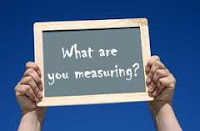Key Performance Indicators (KPIs) is a term that means different things to different people. Here’s a quick roundup:
Why?
When properly used, KPIs can dramatically improve business performance.
Conversely the wrong KPIs can wreck performance, either by encouraging the wrong behaviour, or by taking people’s eyes off the ball.
What?
KPIs are often results like “Revenue”, but are most powerful when used as “Drivers”
Who?
Starting at the top of an organisation, these can filter down each level of the organisation. What’s key to each person in achieving the business’s objectives?
When?
Anything from annually to hourly or less. Weekly can be good, to tie into weekly management meetings.
Where?
Are you taking proper advantage of KPIs in your business?
.
For senior business management - looking at the benefits, issues and opportunities of business technology. We hope you find these articles useful and above all profitable!
Click here for further background Telephone +44(0) 7836 774439
Showing posts with label KPis KRMs KPDs performance. Show all posts
Showing posts with label KPis KRMs KPDs performance. Show all posts
Wednesday, 6 October 2010
Wednesday, 11 August 2010
Business Performance Management - Summary of Recent Articles
Wednesday, 14 July 2010
Performance Management - Types of KPIs

Talking to businesses of all sizes, the term “KPIs” means different things to different people.
Yes the letters stand for “Key Performance Indicators”.
But some people just think of them as revenue, profit and other measures of performance. Is that all?
The real power comes when you consider what factors drive business performance, and how these can be measured. These can be both financial and non-financial.
Indeed it’s worth splitting KPis into two camps:
- KRMs - Key Results Metrics
- KPDs – Key Performance Drivers (the true KP “Indicators”)
Thursday, 1 July 2010
Performance Management - Just fight crime, Theresa May tells police

With huge pressure expected on police budgets, Theresa May the Home Secretary has announced that the last of the previous targets will be dropped to let the police get on with the job.
That’s great, but how can this be reconciled with “If you don’t measure it you can’t manage it”? That’s an important question. Should every business and organization in the land follow suit and drop their KPIs (Key Performance Indicators)?
It would make a mockery of the concept of KPIs. So are KPIs good or evil?
Well it depends how they are implemented:
- There are two types of KPIs – KRMs and KPDs (results and drivers respectively). It’s important to understand which, and have a balanced set
- Key means key. Just a few KPIs that make a difference to the business at each level of management, and in each area.
- Use them appropriately. For example “public” league tables tend to polarize participants into getting better and getting worse, which is rarely what’s required. Just publicly announcing this week’s “winner” would be a better motivator, and discuss other performances privately.
- Watch out for fractions where reducing the denominator at the bottom has a bigger influence than actually doing a better job (e.g. artificially reduce reported crimes to improve % of reported crimes solved)
- Make sure data collection is practical. The key problem with the police is too much time has been spent doing paperwork. In any organisation there has to be a better way to be able to collect data needed for KPIs.
There’s also the matter of how KPIs are communicated. Gauges in dashboards are becoming increasingly popular, and here’s an example of putting speedometer dials into Excel to compare actual against target performance.
What’s your view?
.
Subscribe to:
Posts (Atom)

